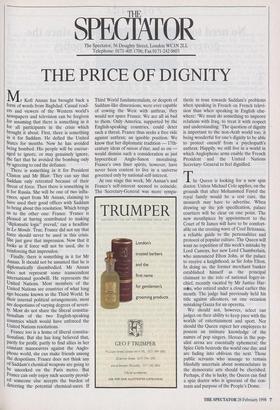SPECT THE AT OR The Spectator, 56 Doughty Street, London WC1N 2LL
Telephone: 0171-405 1706; Fax 0171-242 0603
THE PRICE OF DIGNITY
Mr Kofi Annan has brought back a form of words from Baghdad. Casual read- ers and viewers of the Western world's newspapers and television can be forgiven for assuming that there is something in it for all participants in the crisis which brought it about. First, there is something in it for Saddam. He defied the United States for months. Now he has avoided being bombed. His people will be encour- aged to ignore, or may genuinely ignore, the fact that he avoided the bombing only by agreeing to end the defiance.
There is something in it for President Clinton and Mr Blair. They can say that Saddam only retreated because of their threat of force. Then there is something in it for Russia. She will be one of two influ- ences, apart from Mr Annan, claiming to have used their good offices with Saddam to bring about this resolution. Which brings us to the other one: France. 'France is Pleased at having contributed to making "diplomatic logic" prevail,' ran a headline in Le Monde. True, France did not say that force should never be used in this crisis. She just gave that impression. Now that it looks as if force will not be used, she is reinforcing that impression.
Finally, there is something in it for Mr Annan. It should not be assumed that he is diplomatically disembodied. Mr Annan does not represent some transcendent international goodwill. He represents the United Nations. Most members of the United Nations are countries of what long ago became known as the Third World. In their internal political arrangements, most are despotisms of varying degrees of severi- ty. Most do not share the liberal constitu- tionalism of the two English-speaking countries which would have enforced the United Nations resolutions.
France too is a home of liberal constitu- tionalism. But she has long believed that, partly for profit, partly to find allies in her constant manoeuvres against the Anglo- Phone world, she can make friends among the despotisms. France does not think any of Saddam's chemical weapons are going to be uncorked on the Paris metro. But France can only enjoy such security provid- ed someone else accepts the burden of deterring the potential chemical-users. If Third World fundamentalists, or despots of Saddam-like dimensions, were ever capable of cowing the West with anthrax, they would not spare France. We are all as bad to them. Only America, supported by the English-speaking countries, could deter such a threat. France thus seeks a free ride against anthrax; an ignoble position. We know that her diplomatic tradition — 17th- century ideas of raison d'etat, and so on would dismiss such a consideration as just hypocritical Anglo-Saxon moralising. France's own finer spirits, however, have never been content to live in a universe governed only by national self-interest.
At one stage this week, Mr Annan's and France's self-interest seemed to coincide. The Secretary-General was more sympa- thetic in tone towards Saddam's problems when speaking in French on French televi- sion than when speaking in English else- where: 'We must do something to improve relations with Iraq, to treat it with respect and understanding.' The question of dignity is important to the non-Arab world too, it being wonderful for one's dignity to be able to protect oneself from a psychopath's anthrax. Happily, we still live in a world in which Anglophone arms enable the French President and the United Nations Secretary- General to feel dignified.
The Queen is looking for a new spin doctor. Unless Michael Cole applies, on the grounds that after Mohammed Fayed the royal family would be a rest cure, the monarch may have to advertise. When drawing up the job specification, palace courtiers will be clear on one point. The new mouthpiece by appointment to the Court of St James will have to be comfort- able on the cresting wave of Cool Britannia, a reliable guide to the personalities and protocol of popular culture. The Queen will want no repetition of this week's mistake by Lord Camoys, her new Lord Chamberlain, who announced Elton John, at the palace to receive a knighthood, as Sir John Elton. In doing so, the former merchant banker established himself as the principal claimant to the role of national fogey-in- chief, recently vacated by Mr Justice Har- min, who retired under a cloud earlier this month. The judge had previously held his title against allcomers, on one occasion mistaking Gazza for an operetta.
We should not, however, select our judges on their ability to keep pace with the worlds of entertainment and sport. Nor should the Queen expect her employees to possess an intimate knowledge of the names of pop singers. Heroes in the pop- ulist arena are essentially ephemeral; the Spice Girls bestrode the world one day, and are fading into oblivion the next. Those public servants who manage to remain blissfully uncertain about nomenclature in the democratic arts should be cherished. Perhaps, if she is lucky, the Queen can find a spin doctor who is ignorant of the con- tents and purpose of the People's Dome.


























































 Previous page
Previous page